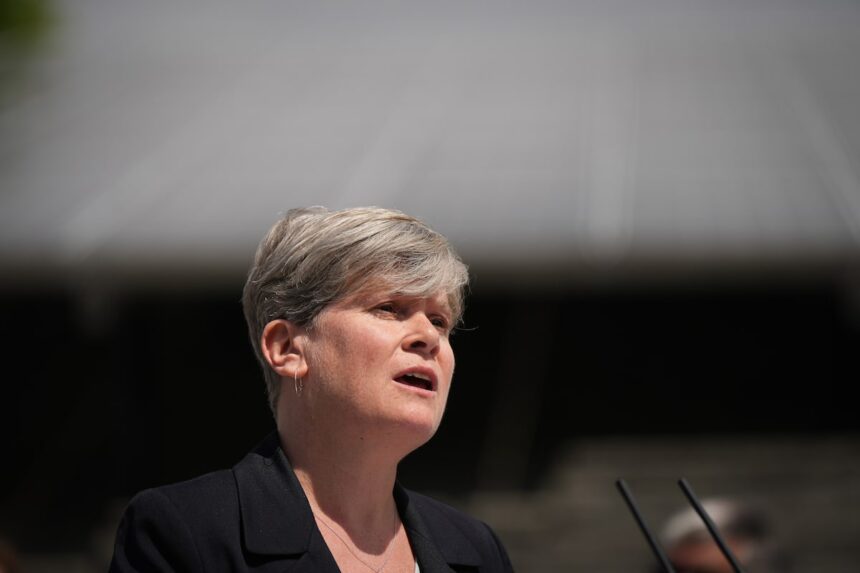The familiar click of hospital machinery fades into background noise as Katelyn Pollock gently adjusts her daughter’s blanket. Four-year-old Charleigh smiles up at her mother—a moment of connection amid the clinical surroundings of BC Children’s Hospital, where they’ve spent countless hours since Charleigh’s diagnosis with the ultra-rare genetic disorder Metachromatic Leukodystrophy (MLD).
“When we first got the diagnosis, I couldn’t even pronounce it,” Katelyn tells me as we sit in the hospital’s family room. “Now I can explain the enzyme deficiency, the myelin breakdown, everything. You become an expert in things you never wanted to know about.”
The Pollock family’s journey took a devastating turn last month when BC Health Minister Adrian Dix denied their request for provincial coverage of Libmeldy, a gene therapy treatment approved by Health Canada that costs approximately $3 million per patient. The treatment has shown remarkable results in halting disease progression when administered early.
“They told us Charleigh doesn’t meet the criteria because her symptoms have progressed too far,” Katelyn explains, her voice steady despite the weight of her words. “But they never created a system to identify children early enough. It feels like they designed a process where nobody qualifies.”
MLD affects approximately one in 100,000 births worldwide, according to the Canadian Organization for Rare Disorders. The disease causes progressive deterioration of motor and cognitive functions as the protective myelin coating around nerves breaks down. Without treatment, children with the infantile form rarely survive beyond early childhood.
In response to questions about the Pollock case, Minister Dix defended the decision, noting that BC follows a “rigorous and evidence-based” approach to drug funding decisions. “These are incredibly difficult situations,” Dix said in a written statement provided to Mediawall.news. “We rely on clinical experts to determine where treatments will be most effective, and unfortunately, not all patients will benefit equally from these extraordinarily expensive therapies.”
But Dr. Ramona Taylor, a pediatric neurologist at the University of British Columbia who specializes in rare genetic disorders (though not directly involved in Charleigh’s care), questions whether the current system adequately addresses ultra-rare conditions.
“Our approval frameworks were designed for more common diseases where you can conduct large clinical trials,” Dr. Taylor explains during our interview at her campus office. “With ultra-rare diseases, you might only have 20 or 30 patients worldwide in a study. The evidence will never look the same as it does for diabetes or heart disease.”
The case highlights a growing tension in Canadian healthcare: how provinces determine which patients receive public funding for rare disease treatments when each therapy can cost millions of dollars per patient. Last year, the federal government announced a $1.5 billion Rare Disease Drug Strategy, but provincial implementation remains inconsistent.
A Statistics Canada report published in January found that families caring for children with rare diseases spend an average of $28,000 annually in out-of-pocket expenses, with many facing financial ruin despite Canada’s universal healthcare system.
For the Pollock family, the funding denial has transformed them into reluctant activists. They’ve launched a GoFundMe campaign that has raised over $400,000 toward Charleigh’s treatment—an impressive sum that still falls far short of the $3 million needed.
On a rainy Tuesday afternoon, I join two dozen supporters at a rally outside the BC Legislature in Victoria. Among them is Jessica Maloney, whose son received provincial coverage for a different rare disease therapy last year.
“The inconsistency is what breaks my heart,” Maloney says, holding a sign with Charleigh’s photo. “My son got his treatment because his disease had more public awareness and a stronger lobby. Is that how we want to decide which children get to live?”
The provincial decision-making process for rare disease therapies involves multiple layers of review, including the BC Drug Benefit Council and the expensive Drugs for Rare Diseases process. Critics argue this system creates nearly insurmountable barriers for ultra-rare conditions.
Laura Sauvé, executive director of the BC Rare Disease Foundation, describes a frustrating pattern where families must become public advocates to secure treatment. “We see this repeatedly—families forced to crowdfund, approach media, and essentially shame governments into providing care,” Sauvé says. “That’s not how healthcare should work in Canada.”
Health economists acknowledge the difficult trade-offs involved. A single ultra-rare disease treatment costing $3 million could fund thousands of hip replacements or diabetic care plans. But advocates question whether strictly utilitarian calculations capture our social values.
“We don’t ask how much a life is worth in other emergency situations,” notes Dr. Taylor. “If a child is trapped in a mine collapse, we don’t calculate the cost-per-life-saved before mounting a rescue. Yet with rare diseases, we subject families to these cold calculations.”
Back at BC Children’s Hospital, Katelyn shows me a video of Charleigh from just eight months earlier—running, laughing, developing like any typical toddler. The contrast with the little girl before us now, who struggles to hold her head up, is stark.
“We’re not giving up,” Katelyn says as she helps Charleigh with a sip of water. “Every day we fight this disease, we’re also fighting a system that wasn’t built for children like her.”
As provincial health ministers prepare to meet next month to discuss the federal rare disease strategy, families like the Pollocks hope their stories will prompt a fundamental rethinking of how Canada approaches these devastating conditions.
“I understand there are limited resources,” Katelyn acknowledges as our interview ends. “But there has to be a better way than telling parents their child isn’t worth saving because their disease is too rare or too expensive. No parent should ever hear those words.”






